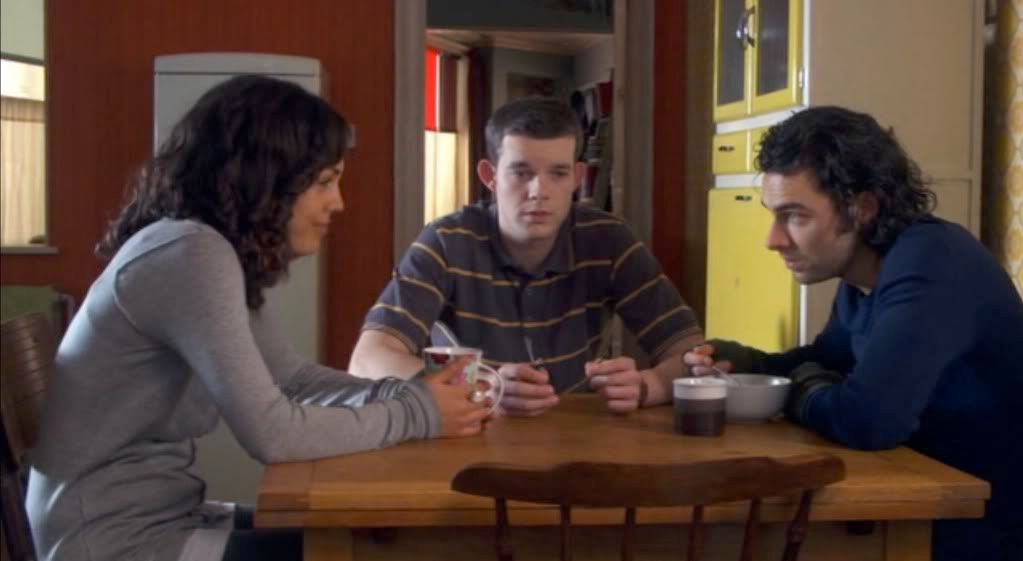 |
| Left to right: Lenora Crichlow as Annie, Russell Tovey as George, and Aidan Turner as Mitchell |
Although the United Kingdom maintains state churches for each of its constituent countries, less than ten percent of its population regularly attends religious services. The home of William Tyndale and John Wesley has become a manifestly secular society. Yet Brits confront the same questions we all do about what we face when we die. Writer Toby Whithouse presents an interesting secular mythology in his TV drama Being Human, a religion that provides shape but, ultimately, no guidance.
Set in Britain’s chilly southwest, Being Human follows vampire Mitchell, werewolf George, and ghost Annie as they struggle to maintain their souls against their encroaching supernatural natures. This struggle proves tough going. Yet as they share a house, they hold each other mutually accountable, which—like a Benedictine monastery—gives them enough discipline to retain vestiges of humanity.
The show sometimes explicitly uses religion. In the first season, George repels vampires using his Star of David pendant. In the second season Christian zealots are the primary antagonists, though they demonstrate little doctrine beyond vengeance. Religion aids this show inasmuch as it recognizes faith’s value; but actual content matters little. In season three, George significantly can’t remember the words to Shema Yisrael, and in the first season, a vicar, asked to say something religious, can only blurt out “Christ!”
Instead, this religion is self-contained. Righteousness and sin both begin inwardly, not from any God or Devil. That’s not to say the religion is egocentric: their primary sacrament is togetherness, while those outside their cloister suffer the full range of sins that stem from individualism. Our ensemble bands together against forces of gluttony, pride, wrath, and the whole Big Seven. Only unity keeps them strong.
The house, then, becomes a place they come together, share their lives, and fight for the same goals. Notably, the kitchen serves as both chapel and confessional. With its connotations of family and stability, the kitchen sees the characters express aspirations, frustrations, and love for one another. Whenever the outside world intrudes, with its expressions of lust, guilt, and envy, the heroes inevitably find themselves hugging or crying at the kitchen table.
In the second episode of season one, Tully, a nomadic werewolf, directs a significant nod at Mitchell and intones: “It’s not many a vampire would break bread with a werewolf.” With its Latinate diction and biblical composition, this sentence’s religious implications stand out prominently. Communion, the act of sharing food, has long held prominence in Christian religious tradition, and continues into this new mythology as well.
The outside world forces them to practice duplicity, but in the kitchen, George and Mitchell repeatedly embrace one another, insisting that each only remains human because of the other. In a telling deleted scene from the third season, after moving to a new house, Annie chooses the kitchen as the place where she calls Mitchell her “saviour.” The characters resist direct action outside the kitchen—in season two, Annie’s living room meeting devolves into subtext—but the kitchen’s informal “prayer meetings” bind the monastery together.
In the second season, Mitchell, accidentally ascendant as vampire king, reorganizes the vampires as an Alcoholics Anonymous meeting. (Season one established blood-drinking as an addiction, not a biological need; vampires can swear off blood, but cannot go “vegetarian” like Stephanie Meyer’s vampires.) Only the first of AA’s twelve steps even mentions alcohol, while five mention God, and others mention prayer, contrition, and evangelism. Thus, though the effort proves doomed, Mitchell turns the vampires into a church.
 |
| Aidan Turner (right) as Mitchell, Jason Watkins (second from right) as vampire king Herrick, and several supporting vampires. |
But despite the religious implications in their relationship, our heroes show little interest in God. They find deliverance in each other, then try to guide each other to that same deliverance. Their spiritual discipline seems remarkably circular, and not surprisingly, the saved keep falling off the straight path. The problem grows because, without a Christ to redeem them or a Buddha to guide them, each lapse into sin requires them to reinvent salvation.
Early in season three, Mitchell must retrieve Annie from the afterlife. Once there, he revisits his most heinous transgressions, until he collapses in tears. On his return, Mitchell calls that afterlife Purgatory: the place where contrition expunges sins. Thus, Being Human’s secular religion promises guilt and penance, not hope. Perhaps this explains why, as the series continues, the outside world looks ever bleaker and more decayed.
If, as Susannah Clements suggests, our treatment of vampires reflects our society’s ethical foundation, we can probably say the same about werewolves and ghosts. And Being Human admits that secularized humans still feel impulses toward religious ritual. Unfortunately, without guidance through our transcendent concerns, we finish our journey afflicted with questions and still starved for answers.
You've made me want to watch it again. I did watch a few episodes, but it didn't grab me (pun intended) the way other BBC dramas have (e.g. Life on Mars, Torchwood, Dr. Who). Fascinatingly examined, sir!
ReplyDelete